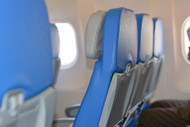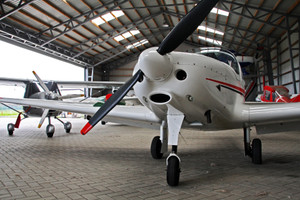5 Popular Flying Myths That Definitely Aren't True
By on Aug 10th 2016
There's something about flying in a heavier-than-air craft 30,000 feet in the air that leads to plentiful fact or fiction debate across the internet...even in this day and age where the answers are quite literally right at our fingertips. Regardless of how or why these flying urban legends continue to proliferate the good old American psyche, we at the Flight Blog are dedicated to providing you with the hard-boiled truth when it comes to aviation, which is why we present to you:
Popular Aviation Urban Legends
(and why they totally aren't true)
1. Airlines Dump Sewage In-Flight
Let's get something straight here: aircraft are not like birds, and a Boeing 777 is not going to drop its crap on you as, say, a seagull might (even though in many places around the world, it's considered good luck if a bird poops on you).

Aircraft lavatories are not built with the ability to be dumped while the plane is in the air: the waste is contained in a holding tank that can only be accessed from the
exterior of the plane by ground crews on the ground. There is no Batman-style lever the pilot can pull to dump the tank over random suburban housing developments. This would actually be impossible given the system design.
If you actually think about it, it seems ridiculous to believe such a myth. . . think about the liability of letting loose human waste of unknown origins from that high an altitude above unknown populations (I imagine it would cause more damage than spitting off the top of the Empire State Building, to be sure). It's a disgusting and hazardous thought, but the myth still exists, and was prevalent enough for the FAA to release a fact sheet in 2005 titled, "It Came from the Sky: Human Waste, Blue Ice," to dispel the myth (the fact sheet is no longer available for viewing on their website).
Why was this necessary? Legends of "blue ice" falling from the sky (which people assume is waste deposited from passenger aircraft toilets), that's why. On the fact sheet, the FAA noted that birds are a possible explanation, as bird migrations coincide with when fruit ripens (potentially explaining the "blue" color). While it is physically impossible for planes to discard their waste while in the air, there are still reports of frozen (and unfrozen) "human" excrement falling from the sky, such as indicated in
this BBC article from January 2016. According to the same article, "international aviation authorities acknowledge that lavatory leaks can occur in the air," and that "Britain's Civil Aviation Authority, for example, has said that around 25 falls of 'blue ice' are reported every year from the 2.5 million flights a year over UK airspace."
Either way, the notion that airplanes can intentionally dump their waste in-flight is crap, pure and simple.
2. Opening an Aircraft's Doors In-Flight is a YUGE Safety Risk
If you're a stressful flier, you have probably had every single worst-case scenario play through your mind, such as the possibility of a disgruntled passenger attempting to pry open a cabin door. While seemingly a common fret among worrisome passengers, there is nothing to fear here (except, perhaps, fear itself (if you're an FDR fan)).
The reason behind why someone isn't going to be able to open a door mid-flight, causing people and carts and little dogs, too, to be sucked out into the surrounding airspace, is because no one can. Pure. And. Simple. Unless you're a mutant with superhuman strength, that is, because that's exactly what you would need to even open the door.
Yeah, this won't actually ever happen
It all has to do with a little thing called (to quote the late great David Bowie) "pressure."
When an airplane is at cruising altitude, it is pressurized. The difference in pressure between the cabin and the outside is far too great for anyone to actually open the door. So, in the event you happen to be on a plane and a passenger
does threaten to yank open that door unless certain conditions are met, it's just not going to happen.
Fun fact: one person
did manage to open an aircraft door in flight, but he had the pilot depressurize the plane first. This was in 1971, and "Dan Cooper" hijacked a Boeing 727, extorted a $200,000 ransom, and then jumped from the rear exit with a parachute. He was never seen from again and his departure inspired"-Cooper vanes" to be installed on aircraft to completely disable the doors while the landing gear is up.
3. Small Holes in Aircraft Will Inevitably Tear Open the Plane
So you're minding your own business, just flying comfortably in your plane, when suddenly, from out of nowhere, your arch nemesis steps into the frame with a gun, and ends up shooting out the window after a brief--yet cinematic--tussle. The pressure in the cabin rapidly changes--it's sheer
chaos. Things begin to fly out the window, including your nemesis--but you, thank god, you think to yourself, thank goodness you didn't pick a window seat, else you'd be hamburger right about now...right?
Yeah, sure...maybe if you were in a James Bond movie.

It's hardly surprising that Hollywood tends to dramatize occurrences for the silver screen. But even
knowing that films and television like to make things bigger and scarier and less plausible than reality doesn't necessarily mean that we're going to keep that in mind when considering whether something seems real or seems mythic. Especially if it's somewhat based on fact.
For example, when a hole occurs in an airplane, the cabin will experience something called "explosive decompression," which of course sounds terrifying. And if the hole is large enough, people who happen to be directly next to the huge hole
can be sucked out (it's happened a couple times). But to reiterate: it has to be a GIANT hole, the people need to be directly next to it when it opens and they can't be wearing their seat belt.
Bombs and large-scale explosions can cause disastrous decompression (and maybe potentially
disintegrate the plane), but small holes won't have that effect, and they won't grow bigger and bigger. Once the pressure escapes the plane, the decompression is over and everything will likely be fine. Unless it was built in your classroom using old homework assignments, most planes are typically made out of a durable material called metal and can handle many stresses without completely falling apart.
4. Oxygen Masks are Decoys and/or Get You High
The first rule of Fight Club is you do not talk about Fight Club. Especially if you're discussing airplane safety.
Remember our discussion about how Hollywood likes to dramatize things? Meaning media meant to
entertain is not always a good source of education. Case in point: Tyler Durden's advice that "Oxygen gets you high... In a catastrophic emergency, you're taking giant panicked breaths. Suddenly you become euphoric, docile. You accept your fate.-
Sorry, Brad Pitt. Sorry, Chuck Palahniuk. This simply isn't true. Now, I like fiction as much as the next person, but we're not going to get too in-depth into the whole
what does this mean/how does this implicate society as a whole? debate.
Simply put, oxygen masks are put on planes in the event of depressurization (see #3 above). If a cabin loses pressure, everyone in the plane is breathing the air at said altitude (generally 30,000 feet), which is oxygen-poor. The oxygen masks are provided so you can breathe normally until the pilots can take the plane down to around 10,000 feet, where the air is more oxygen-rich.
While extra oxygen won't get you feeling high (your hemoglobin will only take in so much oxygen), the lack of enough oxygen in your bloodstream
can make you feel euphoric. Hypoxia (oxygen deficiency) can also cause nausea, apprehension, tunnel vision, headaches, fatigue, dizziness, blurred vision, tingling sensations, numbness, and mental confusion.
So yeah. Adequate oxygen is important.

(Oh, and in case you were wondering, the second rule of Fight Club is you do not talk about Fight Club)
5. Drinking On an Airplane Will Get You Drunk Faster
What's up with being under the influence on aircraft? Ok, we get it...it can be a high-stress environment for many people, so you have a drink. Maybe one, maybe two, maybe the next thing you know is you're seeing either A) a colonial woman or B) a
gremlin on the wing of the plane. No, seriously! It was right there didn't you see it!?
...But you just had one drink, right? (Maybe two, tops) Normally your tolerance for alcohol is
soooo much better, right? It's the altitude...It's messing with you...it's making you drunker quicker, right?
Wrong.
Sorry, guys, in-flight cocktails don't give you any more drunk for your drink. Studies have shown that blood-alcohol levels aren't any higher in the air than on the ground. Everyone's favorite Mythbusters busted this myth (although the page is no longer available on Discovery's website, unfortunately).
Since there's less oxygen in the air inside pressurized airplanes, however, it is possible that you could potentially
feel drunker than you actually are. Flying also dehydrates you (as does drinking alcohol), so watch the post-flight hangovers, too.

ps. In case you were wondering, you probably won't get vacuum-sealed to your airplane toilet seat, either, even if you do flush while you're seated.
Bonus: Finding reasonably-priced aviation lubricants online is impossible
So this myth is clearly the easiest to debunk! All you need to do is check out
Aviation Oil Outlet for the best aviation lubricants at mythic prices. Seriously.







